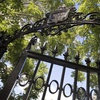{shortcode-096e8bfd22a9403a2af00f64605ce23ff312ce75}
As Harvard takes center stage in a legal showdown against the Trump administration, outgoing College Dean Rakesh Khurana said students should try to block out the noise and go to class.
Since Harvard President Alan M. Garber ’76 publicly rejected the Trump administration’s demands for funding, the University has occupied a front page slot in national newspapers — seen by many observers as a symbol of noble and costly resistance. In the eye of the storm, Khurana said students should tune it out.
“Continue to focus on your work and your education,” Khurana said in a Tuesday interview with The Crimson. “The context is obviously something people pay attention to and it’s good to be aware of, but our primary focus at the College is to make sure that our students are able to make the full use of their academic, social, and personal experiences here.”
But Khurana also acknowledged that Harvard College will be affected by cuts, if the University is unsuccessful in its legal challenge against the Trump administration’s $2.2 billion funding freeze.
“Many faculty and staff and students will work creatively to make sure that our students are able to realize their full academic ambitions and intentions,” he said.
“It may require more creativity than we’ve used in the past, and some pathways need to be reconsidered, but our focus is on ensuring a transformative experience for our undergraduates,” Khurana added.
The direct impacts of the funding cuts on the College’s budget remain unclear, but several Harvard schools, including the T.H. Chan School of Public Health and Harvard Medical School, have begun preparing for layoffs and reductions in programming in the face of the freeze.
Even before the Trump administration announced its initial review of nearly $9 billion in federal funding, Garber announced a University-wide hiring freeze, which has sent ripples through Faculty of Arts and Sciences departments and left professors scrambling to fill vacancies and rearrange courses.
Khurana suggested the College might evaluate which programs are essential to its core mission.
“It could also involve thinking about those aspects of our experience which were nice to have but not necessary to have so as to allow a greater number of students to participate in certain programs,” he said.
Several Harvard-affiliated researchers have received stop-work orders on contracts worth tens of millions of dollars. Undergraduates, as a result, could face more limited opportunities to join labs or find positions that are still being hired for amid the hiring freeze.
Addressing this reality, Khurana said the classroom may take a larger role in training students.
“We are also looking to make sure that our classes can provide certain skills that students might otherwise have gotten through a paid opportunity,” he said.
In the hours following Garber’s announcement that Harvard would not accede to the White House’s demands, the University experienced a surge in individual alumni donations. Though the gifts made up a tiny fraction of the billions in funding slashed by the White House, Khurana said he was grateful for the show of support.
“We’re fortunate that we have a lot of people who want to support our community at this time,” he said. “At this moment, many people believe that the right to pursue truth without threat and reprisal is a fundamental right, not only for universities, but for our society.”
“Harvard, being older than the country, I think has a particular role in setting the tone for this fundamental right that all of us as Americans enjoy,” Khurana added.
—Staff writer Samuel A. Church can be reached at samuel.church@thecrimson.com. Follow him on X @samuelachurch.
—Staff writer Cam N. Srivastava can be reached at cam.srivastava@thecrimson.com. Follow him on X @camsrivastava.
Read more in News
Founder of The Dogist Talk All Things Dogs at Kirkland House












